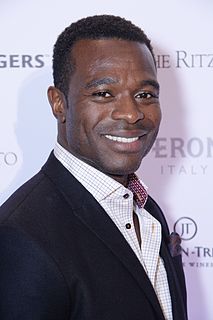A Quote by Gilbert K. Chesterton
When a woman puts up her fists to a man she is putting herself in the only posture in which he is not afraid of her.
Related Quotes
The real trouble about women is that they must always go on trying to adapt themselves to men's theories of women, as they alwayshave done. When a woman is thoroughly herself, she is being what her type of man wants her to be. When a woman is hysterical it's because she doesn't quite know what to be, which pattern to follow, which man's picture of woman to live up to.
Men and women are made for each other, but their mutual dependence differs in degrees; man is dependent on woman through his desires; woman is dependent on man through her desires and also through her needs; he could do without her better than she can do without him. She cannot fulfill her purpose in life without his aid, without his goodwill, without his respect.....Nature herself has decreed that woman, both for herself and her children, should be at the mercy of man s judgment.
Her little fists pummeled at him, and he accepted the abuse. Until he realized she’d made an improper fist and was actually hurting herself. He wound an arm around her waist, spun her and slammed her into the hard line of his body to still her. “Let me go!” “In a minute.” As she struggled, he pulled her thumb out from beneath her fingers and rearranged her fist. “Hit like this.” Done, he released her.
Virtue and vice suppose the freedom to choose between good and evil; but what can be the morals of a woman who is not even in possession of herself, who has nothing of her own, and who all her life has been trained to extricate herself from the arbitrary by ruse, from constraint by using her charms?... As long as she is subject to man's yoke or to prejudice, as long as she receives no professional education, as long as she is deprived of her civil rights, there can be no moral law for her!
The woman is the man's glory, and she naturally delights in the praises which are assurances that she is fulfilling her function; and she gives herself to him who succeeds in convincing her that she, of all others, is best able to discharge it for him. A woman without this kind of "vanity" is a monster.
She realized how many of her beliefs were either unrealistic or belonged to her deceased parents and her ex-husband. She also realized that her expectations for herself and others were sometimes too rigid. She was trying to live up to what everyone else said was best for her, which made her depressed and hard to be around at times. Once she changed her beliefs about herself and others, she began to smile more and enjoy life.
The extraordinary woman depends on the ordinary woman. It is only when we know what were the conditions of the average woman's life - the number of children, whether she had money of her own, if she had a room to herself, whether she had help bringing up her family, if she had servants, whether part of the housework was her task - it is only when we can measure the way of life and experience made possible to the ordinary woman that we can account for the success or failure of the extraordinary woman as a writer.
It was so important that women were involved in 'She's Gotta Have It' because it's about a woman's opinion. It's about her views of herself, and the world around her, and how the world perceives her, and finding that ground for herself - not even a common ground, but that ground for herself in which she can walk on firmly with confidence.
I value in the cat the independent and almost ungrateful spirit which prevents her from attaching herself to any one, the indifference with which she passes from the salon to the housetop. When we caress her, she stretches herself and arches her back responsively; but this is because she feels an agreeable sensation, not because she takes a silly satisfaction, like the dog, in faithfully loving a thankless master. The cat lives alone, has no need of society, obeys only when she pleases, pretends to sleep that she may see more clearly, and scratches everything on which she can lay her paw.
Few countries have produced such arrogance and snobbishness as America. Particularly is this true of the American woman of the middle class. She not only considers herself the equal of man, but his superior, especially in her purity, goodness, and morality. Small wonder that the American suffragist claims for her vote the most miraculous powers. In her exalted conceit she does not see how truly enslaved she is, not so much by man, as by her own silly notions and traditions. Suffrage can not ameliorate that sad fact; it can only accentuate it, as indeed it does.
The universal nature has no external space; but the wondrous part of her art is that though she has circumscribed herself, everything which is within her which appears to decay and to grow old and to be useless she changes into herself, and again makes other new things from these very same, so that she requires neither substance from without nor wants a place into which she may cast that which decays. She is content then with her own space, and her own matter, and her own art.






































